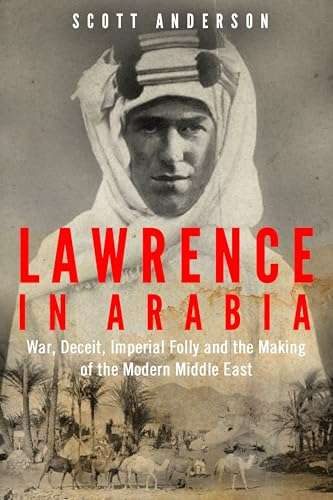Lawrence in Arabia: War, Deceit, Imperial Folly and the Making of the Modern Middle East
Published by Atlantic Books, 2014, softcover, illustrated, index, 572 pages, condition; as new.
By the second decade of the twentieth century, the Ottoman Empire had long been in a state of seemingly terminal decline. The proverbial sick man of Europe, its epitaph had begun to be written as far back as the 1850s, and in the intervening years no fewer than five of the imperial powers of Europe had taken turns snatching away great swaths of its territory. That the Ottomans had managed to avoid complete destruction thus far was due both to their skill at playing off those competing European powers and to no small measure of improbable good luck. In 1914, however, all that was about to change. By guessing wrong very wrong in the calamitous war just then descending, the Ottomans would not only bring on their own doom but unleash forces of such massive disintegration that the world is still dealing with the repercussions a century later
- Scott Anderson, Lawrence in Arabia: War, Deceit, Imperial Folly and the Making of the Modern Middle East
Despite the ennobling gloss later applied by President Woodrow Wilson, the First World War is best understood as a purely European conflict that slipped the borders of the continent. Though it was fought on all corners of the globe, this was a function of the imperial nature of the main players, whose far-flung colonies had helped precipitate the conflict in the first place. Far from an attempt to make the world safe for democracy, the First World War more resembled the Napoleonic Wars of the early 1800s, waged to establish the hierarchy of Europe. The main differences in the two struggles, separated by a century, were the technologies involved, and the array of allies chosen by each side.
This is a complex story, with many interlocking parts. If you are looking for a broad overview, Scott Andersons Lawrence in Arabia is probably not where you want to start. But if you already know the overarching framework, and want a ground-level presentation of how it played out, told in novelistic fashion through the eyes of the participants, you cant do better than this. Towering above them all is Thomas Edward Lawrence, the famous and controversial Lawrence of Arabia. A young officer with no true military background (he was an archaeologist before the war), Lawrence found himself in a sideshow of a sideshow, able to do a remarkable amount of geopolitical freelancing in the deserts. With the attention of Great Britain focused intently on the Western Front, he set about bending events to his will. Together with Faisal ibn Hussein, Lawrence helped formulate an overall strategy for the Arab Revolt, while also capturing key cities, shooting up trains, and blowing up bridges. Despite their success, Faisals vision of a pan-Arab nation never came to pass.

